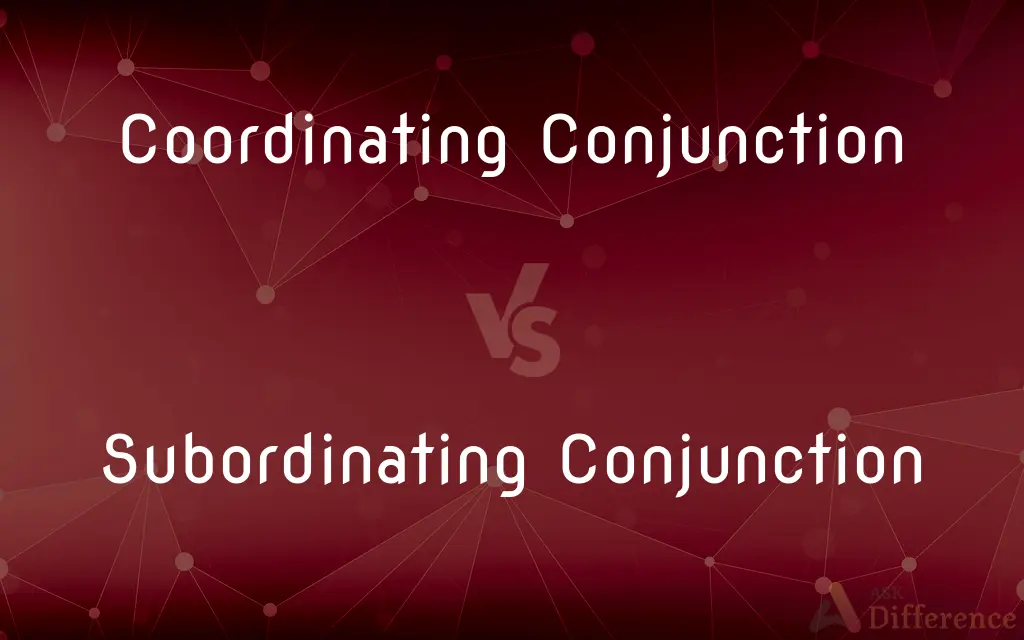Coordinating Conjunction vs. Subordinating Conjunction — What's the Difference?
Edited by Tayyaba Rehman — By Fiza Rafique — Published on December 27, 2023
Coordinating Conjunctions link equal grammatical elements, while Subordinating Conjunctions connect a main clause to a subordinate one.

Difference Between Coordinating Conjunction and Subordinating Conjunction
Table of Contents
ADVERTISEMENT
Key Differences
Coordinating Conjunctions play a fundamental role in English grammar by connecting words, phrases, or clauses of equal rank. This means that the elements they connect hold similar grammatical weight. Subordinating Conjunctions, conversely, have the function of linking a main or independent clause to a subordinate or dependent one, establishing a relationship between them.
When you use a Coordinating Conjunction, you're essentially showing that the two connected elements are on equal footing. For instance, "I like apples and oranges." The use of "and" connects two similarly important items. On the other hand, Subordinating Conjunctions introduce a clause that cannot stand alone because it doesn't convey a complete thought. For example, "Although it rained, we played outside." The word "Although" introduces a dependent clause.
One can observe that Coordinating Conjunctions often create compound sentences, while Subordinating Conjunctions are pivotal in complex sentences. The distinction between them ensures varied sentence structures in writing, enhancing fluidity and comprehension.
Comparison Chart
Purpose
Links equal grammatical elements
Connects a main clause to a subordinate one
Resulting Sentence Type
Often results in compound sentences
Leads to complex sentences
ADVERTISEMENT
Independence of Clauses
Joins independent clauses
Joins an independent clause to a dependent one
Examples
"and," "but," "or," "nor," "for," "so," "yet"
"because," "although," "since," "unless," "while"
Position in Sentence
Can often be moved around without changing the sentence's meaning
Fixed position, pivotal to the relationship between clauses
Compare with Definitions
Coordinating Conjunction
Coordinating Conjunctions indicate specific relationships between connected elements.
You can have cake or pie, not both.
Subordinating Conjunction
Subordinating Conjunctions provide context to the main clause.
Since you're here, you might as well help.
Coordinating Conjunction
Coordinating Conjunctions connect words of equal grammatical value.
I like tea and coffee.
Subordinating Conjunction
Subordinating Conjunctions highlight relationships between clauses.
Although he studied hard, he didn't pass the test.
Coordinating Conjunction
Coordinating Conjunctions can join two independent clauses.
She was tired, but she finished her work.
Subordinating Conjunction
Subordinating Conjunctions introduce dependent clauses.
I stayed home because I was sick.
Coordinating Conjunction
Coordinating Conjunctions enhance sentence flow and cohesion.
I didn't bring an umbrella, for I didn't expect rain.
Subordinating Conjunction
Subordinating Conjunctions lead to complex sentences.
I'll go to the store unless it starts to rain.
Coordinating Conjunction
Coordinating Conjunctions are used in compound sentences.
I wanted to go for a walk, so I put on my shoes.
Subordinating Conjunction
Subordinating Conjunctions add depth and detail to writing.
While I was eating, the phone rang.
Common Curiosities
How are Subordinating Conjunctions different from Coordinating Conjunctions?
Subordinating Conjunctions link a main clause to a subordinate or dependent one, indicating a relationship.
Can Coordinating Conjunctions join two sentences?
Yes, Coordinating Conjunctions can join two independent clauses to form compound sentences.
What's the main role of a Subordinating Conjunction in a sentence?
A Subordinating Conjunction introduces a dependent clause, creating a relationship with a main clause.
Do Coordinating Conjunctions always come between the elements they're connecting?
Typically, yes. For example, in "apples and oranges," "and" is between the two nouns.
Can you start a sentence with a Subordinating Conjunction?
Yes, sentences can start with Subordinating Conjunctions, like "Although" or "Because."
Do Subordinating Conjunctions determine the tense of the verb in the dependent clause?
No, they don't determine tense, but they can influence the verb's mood or form.
What do Coordinating Conjunctions connect?
Coordinating Conjunctions connect words, phrases, or clauses of equal grammatical rank.
What are some examples of Coordinating Conjunctions?
Examples include "and," "but," "or," "nor," "for," "so," and "yet."
Is it possible to have a sentence with both types of conjunctions?
Yes, a sentence can contain both Coordinating and Subordinating Conjunctions for varied complexity.
Which conjunction type leads to compound sentences?
Coordinating Conjunctions often result in compound sentences.
What type of sentence does a Subordinating Conjunction typically create?
Subordinating Conjunctions are instrumental in forming complex sentences.
Can you give examples of Subordinating Conjunctions?
Certainly! Examples include "because," "although," "since," "unless," and "while."
How many Coordinating Conjunctions are commonly recognized in English?
There are seven commonly recognized Coordinating Conjunctions, often remembered by the acronym FANBOYS.
Which conjunction type is more flexible in sentence positioning?
Coordinating Conjunctions are more flexible, while the position of Subordinating Conjunctions is pivotal to clause relationships.
Can a dependent clause introduced by a Subordinating Conjunction stand alone?
No, it can't stand alone as it doesn't express a complete thought.
Share Your Discovery

Previous Comparison
2G Network Technology vs. 3G Network Technology
Next Comparison
Duodenum vs. JejunumAuthor Spotlight
Written by
Fiza RafiqueFiza Rafique is a skilled content writer at AskDifference.com, where she meticulously refines and enhances written pieces. Drawing from her vast editorial expertise, Fiza ensures clarity, accuracy, and precision in every article. Passionate about language, she continually seeks to elevate the quality of content for readers worldwide.
Edited by
Tayyaba RehmanTayyaba Rehman is a distinguished writer, currently serving as a primary contributor to askdifference.com. As a researcher in semantics and etymology, Tayyaba's passion for the complexity of languages and their distinctions has found a perfect home on the platform. Tayyaba delves into the intricacies of language, distinguishing between commonly confused words and phrases, thereby providing clarity for readers worldwide.














































